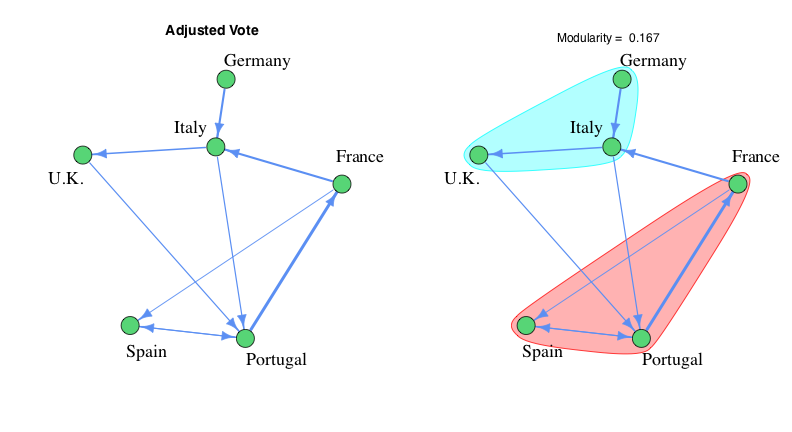Decoding Eurovision: How The Points Are Awarded

Table of Contents
The Two Voting Systems: Jury and Televoting
The Eurovision Song Contest utilizes a dual voting system: professional juries and televoting. Both play a crucial role in determining the final outcome, offering a blend of expert opinion and popular preference.
- Professional Juries: Each participating country has a jury of five music industry professionals tasked with assessing the songs based on artistic merit, musical performance, composition, and overall stage presentation. These individuals are carefully selected to ensure impartiality and expertise, representing a diverse range of musical backgrounds. Jury members are kept secret until after they have cast their votes, preventing external influence and bias.
- Televoting: The public plays a vital role through televoting, allowing viewers in each participating country to vote for their favourite songs. This is typically done via SMS, dedicated apps, or landline phone calls, ensuring broad participation. To counteract potential regional biases, the Eurovision system employs measures to ensure a geographically balanced distribution of votes, minimizing the impact of concentrated voting from specific areas.
The weighting between jury and televoting scores varies from year to year, but both contribute significantly to the final result. The exact weighting is usually announced prior to the contest. This system strives to balance critical appraisal with popular appeal, generating a result reflecting a broad spectrum of perspectives.
The Points Allocation Process: From Scores to Rankings
The points allocation process is where the magic (and sometimes the drama) truly happens. Here’s how it works:
- Compilation of Scores: Each country's jury and televoting scores are independently compiled into a national ranking. This means each country ranks all participating songs from 1 to 26 (or fewer, depending on the number of contestants).
- Points Award: Points are then awarded based on this ranking: 12 points for the top-ranked song, 10 for second, and so on, down to 1 point for the song in 10th place. Songs ranked below 10th receive no points.
- Announcing the Points: During the live show, each country's spokesperson announces their points allocation one by one, creating a moment of suspense and excitement. The spokespersons are usually prominent figures from the participating country’s media or entertainment industry.
- Dealing with Ties: In the rare event of ties in rankings, a specific protocol is followed to ensure a fair and accurate final result, although the specifics of this protocol are not generally made public. The process aims to maintain clarity and transparency as far as possible.
Understanding the Eurovision Voting System: Key Considerations
While the Eurovision voting system aims for fairness and transparency, certain biases can influence the results.
- Neighborhood Voting: A common observation is "neighborhood voting," where countries tend to score their geographic neighbors higher. This is a complex phenomenon, possibly explained by shared cultural affinities or broadcasting habits.
- Political Influences: Although less overt, political factors can occasionally play a role. Historical tensions or political alliances between nations might subtly influence voting patterns.
- Fairness and Transparency: The Eurovision Organization continually strives to improve the fairness and transparency of the voting process, introducing measures to mitigate potential biases and improve the system's integrity. However, debates about the system's fairness remain a constant part of the Eurovision narrative.
Examples: Some countries consistently score high (e.g., due to popular artists), while others consistently score low. Analyzing geographic voting patterns can reveal interesting insights into these trends. Accessing official Eurovision rulebooks and reviewing past results can provide more detailed information for analysis.
The Impact of the Voting System on the Eurovision Contest
The Eurovision voting system significantly shapes the competition's dynamics and influences the kinds of songs submitted by participating countries:
- Musical Diversity: The system, in theory, should encourage diverse musical styles, as artists try to appeal to both juries and the public. However, the system might unintentionally incentivize certain genres over others, making it a constant subject of discussion and debate.
- Evolution of the System: The Eurovision voting system has evolved over time, with adjustments made in response to criticisms and evolving technological possibilities. These changes aim to maintain the system's relevance and responsiveness to audience expectations. Researching the history of voting changes would reveal further information regarding improvements and adjustments.
- Ongoing Debates: Debates about the fairness and effectiveness of the system persist, driving discussions about potential reforms and future changes.
Mastering the Eurovision Points System
In conclusion, understanding the Eurovision points awarding system requires appreciating both the professional judgment of the juries and the popular vote of televoting. This dual system, although complex, adds another layer of intrigue and excitement to the competition. The points allocation process, from initial scores to the final announcement, is a carefully choreographed event that determines the ultimate Eurovision champion.
Now that you've decoded the Eurovision points system, what are your thoughts on the fairness and impact of this unique voting method? Share your opinions in the comments below!

Featured Posts
-
 A Simple Explanation Of Eurovisions Voting System
May 19, 2025
A Simple Explanation Of Eurovisions Voting System
May 19, 2025 -
 Nos Alive 2025 Your Guide To Headliners Lineup Tickets And Festival Details
May 19, 2025
Nos Alive 2025 Your Guide To Headliners Lineup Tickets And Festival Details
May 19, 2025 -
 From Public Funds To Private Palates Orlandos Transformation Into A Foodie Hub
May 19, 2025
From Public Funds To Private Palates Orlandos Transformation Into A Foodie Hub
May 19, 2025 -
 Dessert Francais Facile Recette Du Salami Au Chocolat
May 19, 2025
Dessert Francais Facile Recette Du Salami Au Chocolat
May 19, 2025 -
 Brett Goldsteins The Second Best Night Of Your Life Premiere Date Announced
May 19, 2025
Brett Goldsteins The Second Best Night Of Your Life Premiere Date Announced
May 19, 2025
